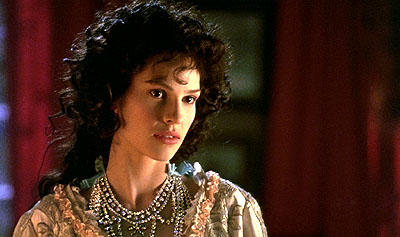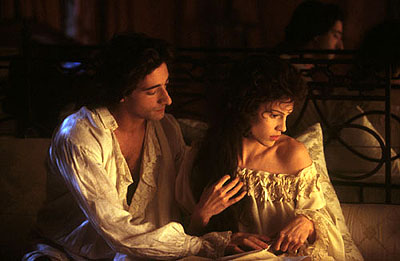

One of the lesser-known scandals immediately preceding the French Revolution was the so-called Affair of the Necklace, which helped to cement the populist image of Marie Antoinette as a member of the spoiled, out-of-touch royalty. Some claim that it was one of the reasons for the Revolution. Everything was the result of the machinations of Comtesse Jeanne de la Motte-Valois, who was trying to regain her family honor. The Affair of the Necklace is a marked departure for director Charles Shyer, who usually makes movies like Father of the Bride Part II and I Love Trouble. Apparently, he is not completely used to the concept of making a period film, since some of his comedic tendencies emerge later in the film. The Affair of the Necklace starts as a historical/political drama, then develops a tongue-in-cheek attitude towards itself. This causes the film to lose its tension and dramatic development, and instead elicits confused reactions.
Shyer and writer John Sweet (The Great Elephant Escape, Face to Face) do manage to explore the politics behind the Affair. Jeanne's (Hilary Swank, The Gift, Boys Don't Cry) only desire is to vindicate her family. She believes that the King confiscated her father's estate unfairly, and seeks an audience with the King or with Marie Antoinette (Joely Richardson, The Patriot, Maybe Baby), who is ignoring her. To gain access, she marries Count Nicholas de la Motte (Adrien Brody, Bread and Roses, Liberty Heights) to elevate her social status. She then meets Retaux de Villette (Simon Brody, Red Planet, Ride with the Devil), who agrees to help her reach the Queen. They concoct a plan involving a beautiful, 2,800 carat diamond necklace. Some jewelers offered it to the King, who refused it. De la Motte uses the corrupt Cardinal de Rohan (Jonathan Pryce, Bride of the Wind, Stigmata) to get to the Queen. He wants to rekindle a relationship that ended long ago, and de la Motte-Valois forges letters from the Queen, hoping to get him to buy the necklace for her. Rohan does not know that the Queen already refused the necklace, which was originally a gift for the King's mistress.
Everything about the film up to this point is about the schemes that everybody is hatching. It's great watching these people, all with their own agendas, try to use each other. Sweet's script accurately captures the hypocrisy of the nobility and their blatant grabs for power amongst each other. Jeanne's plan is especially complex, and relies on many people making specific decisions in response to actions by others. When things do not go the way she planned, everything begins to crumble quickly, and Jeanne and Retaux must come up with contingencies. Shyer does have a good eye for his sets, draped in the opulence that defined the French aristocracy at that time. The focus of the movie slowly drifts from the entire scheme to focusing more on Jeanne. The script turns her into a heroine. Regardless of whether she is one or not, it really changes the tone of the movie for the worse. Shyer also includes some droll narration by someone who turns out to be a character in the film, which is more distracting than anything else.
Richardson does a good job playing the spoiled Marie Antoinette, and Pryce is a good foil as the pining man of the cloth. The oddest choice for a role is Christopher Walken (American Sweethearts, Joe Dirt), who plays Count Cagliostro, the head of the Illuminati. Walken's appearance marks the point where The Affair of the Necklace turns away from intrigue and more into a cheesy romance melodrama. He brings his patented weirdness to an already strange role. In the meantime, Swank is still looking to equal her critical success in her Oscar winning role in Boys Don't Cry. As Jeanne, she plays a headstrong, smart woman looking to redeem her family, who schemes her way to the equal of a Cardinal. It seems like a worthy role, but the lame romance with Retaux bogs down her performance. Tackling a period drama is a big step, but hopefully she'll look for one with a better script next time.